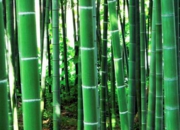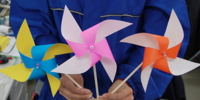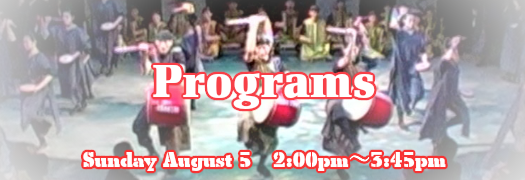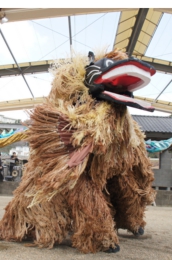
Mei-nu-hama(The Beach)
- A song praising nature, especially the blessings of nature.
Shishi-mai (Lion Dance)
- Shishi is popular throughout Japan as a talisman god. It walks around to pray for avoiding bad diseases and various disasters.
Watarizou Tachitoushisugakachi
- Classical music handed down from the Ryukyu Kingdom. Its words show good luck and joyfulness.
Ryu-mai (Dragon Dance)
- In China and some other Asian countries people perform dragon dances to pray for rain and rich harvest. The way a dragon dances high above inspires us with long life and prosperity, giving us happiness and good luck.
Asadoya-yunta(Song of Ms. Asadoya)
- A man in power tried to own a daughter, but she refused it. The song shows the story of the man and the daughter.
Tenyo-bushi(Song of Tenyo)
- A song expressing joy for rich harvest and festivals.
Toshin-doi(Song of Arrival of Chinese Ships)
- In old times it was joy for Okinawan people that a mission of China came in a ship. This song expresses their joyfulness.


Heiwa-no-ryuka(Song for Peace in Okinawa)
- Apparently Japan seems peaceful, but is it really peaceful? We wish for the real peace in Okinawa, where a lot of U.S. fighter jets have been flying off from the military bases.
Satokibi-batake (Song of Sugarcane Fields)
- Under sugarcane fields in Okinawa are buried a lot of bones of people killed in the Okinawan war. Zawawa, Zawawa, which imply the sound of wind blowing over sugarcane fields in summer, are repeated with prayer for peace.
Take-no-uta (Song of Bamboo)
- Japan has a lot of earthquakes, tsunamis, and fires. However terribly the land is damaged, bamboo can thrive by extending its roots, and regenerate soon. We wish human beings should have the strength like that.
15-minute break


Jinjin(Fireflies)
- Jinjin means a firefly in Okinawan dialect. The song is sung and played in the rock style.
Tinsagu-nu-hana(Flowers of Garden Balsams)
- Girls make their nails red using flowers of garden balsams. Like this, we should accept our parents’ selfless love from the bottom of our heart, and keep living with sincerity and patience. This song gives us such a message.
Erabu-no-komoriuta (Lullaby in Erabu)
- Kajimaya means a pinwheel. In Okinawa, longevity celebration for men and women who become 97 is also called kajimaya. People give a ride to such an old man or woman in a vehicle and march in parade throughout his/her village, letting him/her hold a pinwheel.
Warabi-gami (Children’s God)
- A lullaby. In Okinawa babies are considered to be given from the heaven. People cradle babies, singing this song. In this performance mothers lose their children in the war. With this performance, we won second place in the nationwide Creative Eisa Contest in 2010.
Sakura (Cherry Blossoms)
- A song expressing the beauty of cherry blossoms, which symbolize Japan.
Karakoro Drums of Japan
Sunday August 5
2:00pm〜3:45pm
KARAKORO [Karada to Kokoro no Deaino-kai]
6-6-17-201,Nishinakajima Yodogawa-ku Osaka Japan
e-mail office@karakoro.org phone.416-454-5923




 HOME
HOME